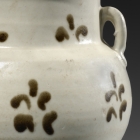J.J. Lally & Co., Oriental Art / New York City, New York
MenuPast Exhibition
Chinese Art: The Szekeres Collection
March 13-29, 2019
6.
A PAINTED CIZHOU POTTERY JAR
Northern Song Dynasty, 12th Century
the globular body with short cylindrical neck rising to a wide mouth with lipped rim, applied with a pair of double-stranded loop handles joining the neck to the narrow sloping shoulder, decorated with clusters of teardrop motifs suggesting leafy fronds painted in chocolate brown over a clear glaze and white slip ground, ending in sweeping lines short of the thick ring foot, revealing the gray stoneware body.
Height 5 3⁄4 inches (14.6 cm)
A Cizhou jar of similar form painted in brown with a closely related pattern in the collection of the Metropolitan Museum of Art, New York, is illustrated by Mino and Tsiang, Freedom of Clay and Brush through Seven Centuries in Northern China: Tz’u-chou Type Wares, 960-1600 A.D., Indianapolis, 1980, pp. 112-113, no. 44, where the authors attribute this group of Cizhou ware decorated with teardrop motifs to the 12th century on the basis of their close relationship to ceramics excavated at Julu xian, Hebei province, the well-known site which was inundated by the Yellow River floods in the second year of Daguan, corresponding to 1108.
Compare also the similarly decorated Cizhou jar of closely related shape in the Museum of Fine Arts, Boston, illustrated by Tseng and Dart, The Charles B. Hoyt Collection in the Museum of Fine Arts: Boston, Vol. II, Boston, 1972, pl. 88, described as possibly from Julu xian.
北宋 磁州白地褐花雙耳罐 高 14.6 厘米
